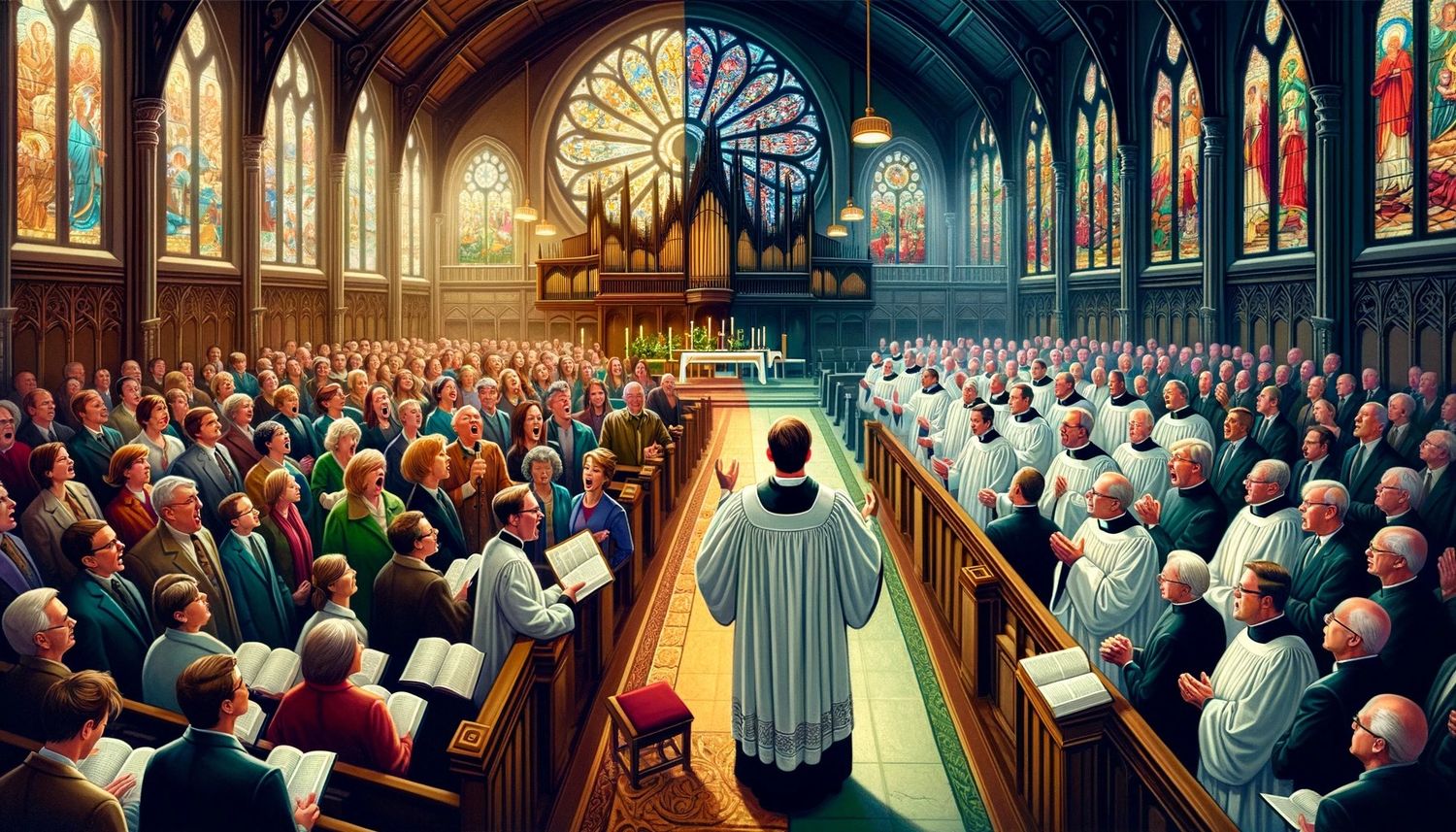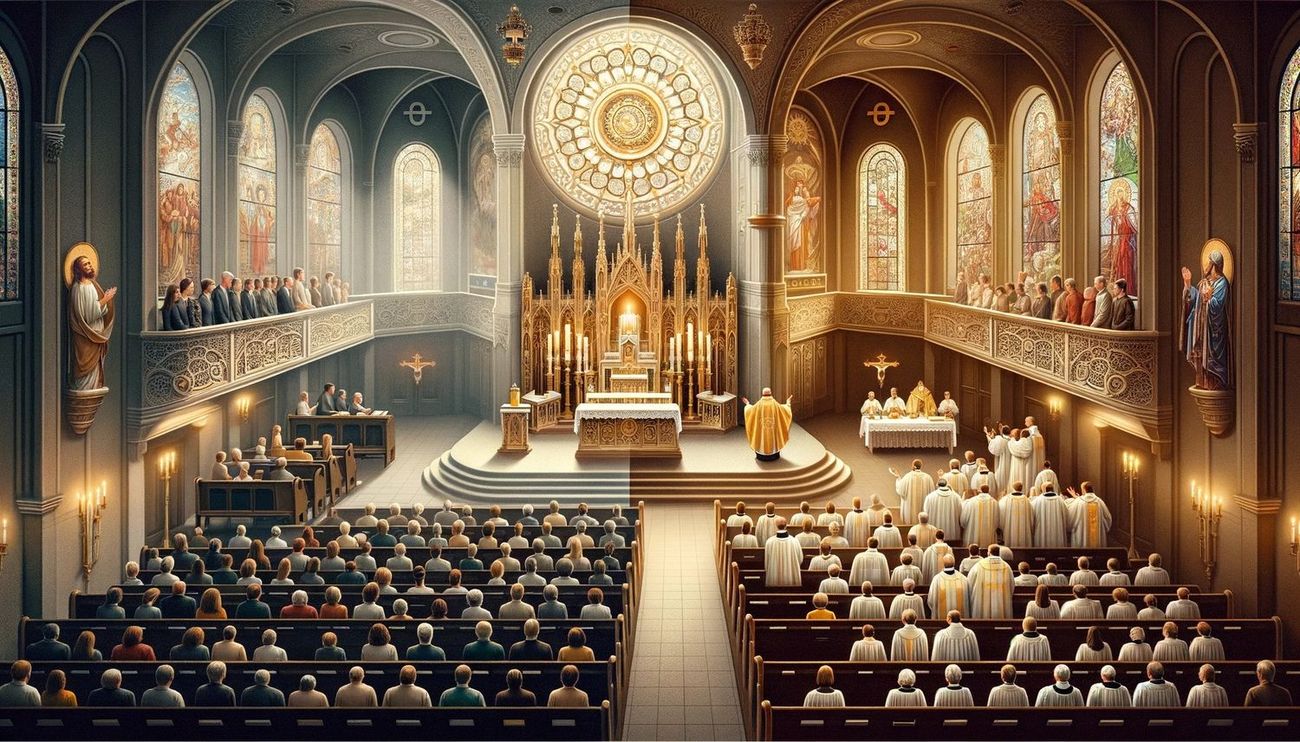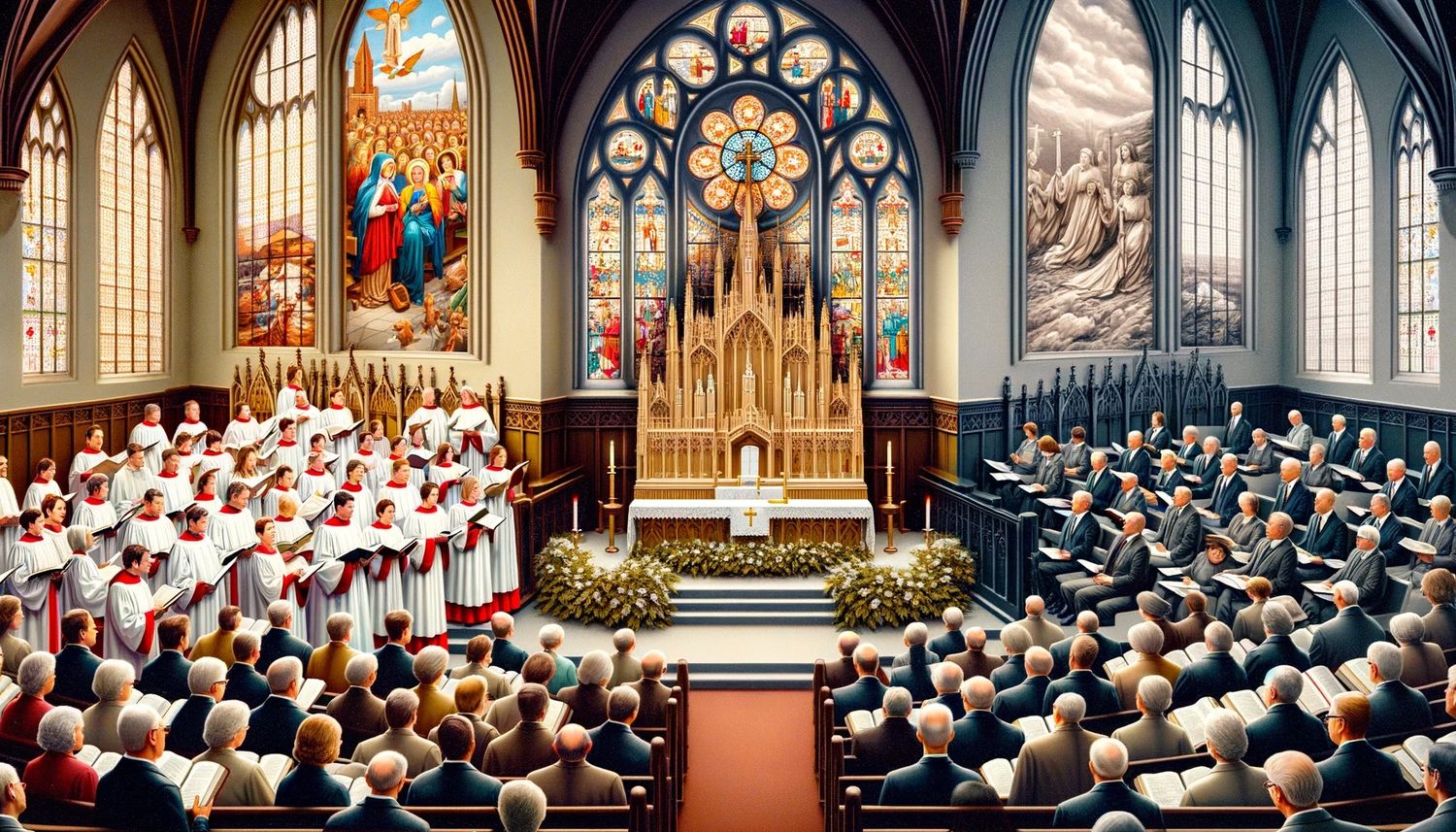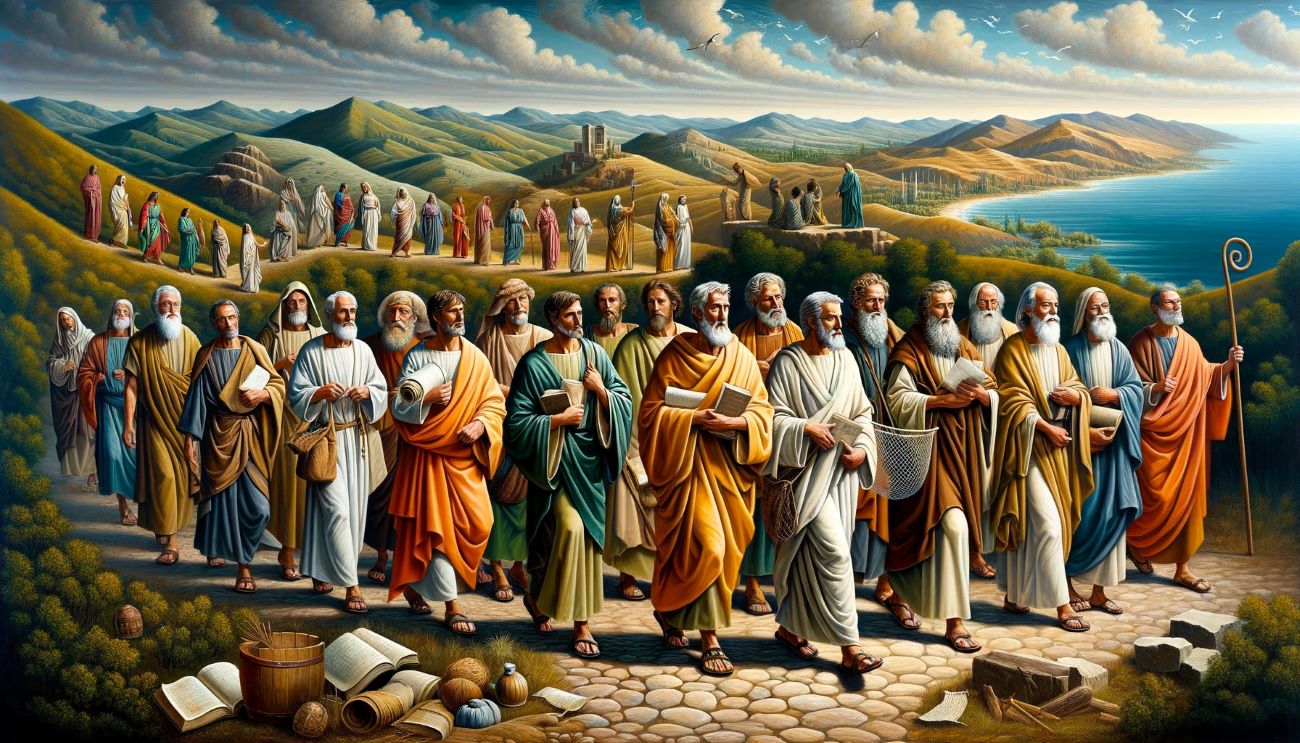Home>Theology and Spirituality>What Is The Difference Between Methodist And Lutheran


Theology and Spirituality
What Is The Difference Between Methodist And Lutheran
Published: March 3, 2024
Jason DeRose, Managing Editor at Christian.net, uses his expertise in religion and journalism to deepen understanding of faith's societal impacts. His editorial leadership, coupled with a strong academic background, enriches the platform’s diverse content, earning him recognition in both journalism and religious circles.
Discover the key distinctions between Methodist and Lutheran beliefs, practices, and traditions in the realm of theology and spirituality. Explore the nuances of these two prominent Christian denominations.
(Many of the links in this article redirect to a specific reviewed product. Your purchase of these products through affiliate links helps to generate commission for Christian.net, at no extra cost. Learn more)
Table of Contents
Introduction
What is the difference between Methodist and Lutheran? This is a question that often arises when exploring the diverse landscape of Christian denominations. While both Methodism and Lutheranism are rooted in the Protestant Reformation and share some commonalities, they also have distinct theological, historical, and practical differences that set them apart. In this article, we will delve into the history, beliefs, practices, worship, sacraments, leadership, governance, and ecumenical relations of Methodist and Lutheran churches to gain a comprehensive understanding of their unique identities within the broader Christian tradition.
History of Methodism and Lutheranism
Methodism
-
Methodism traces its roots back to the 18th century, when it emerged as a movement within the Church of England. The founder, John Wesley, along with his brother Charles, sought to revitalize the Church of England by emphasizing the importance of personal faith and holiness. This emphasis on personal piety and the pursuit of holiness led to the development of small groups and societies for spiritual accountability and growth.
-
The Methodist movement quickly spread to the American colonies, where it gained significant traction and eventually became a separate denomination. Methodism's emphasis on social justice, evangelism, and the empowerment of the laity has been a defining feature of its history and identity.
Lutheranism
-
Lutheranism, on the other hand, has its origins in the 16th-century Protestant Reformation, spearheaded by Martin Luther in Germany. Luther's critique of the Catholic Church's teachings and practices led to the formation of a distinct theological tradition that emphasized the authority of scripture, justification by faith alone, and the priesthood of all believers.
-
Lutheranism spread throughout Europe and beyond, influencing the development of diverse national and regional Lutheran traditions. The Lutheran movement has been characterized by its rich liturgical heritage, emphasis on the sacraments, and commitment to the proclamation of the Gospel.
In summary, while both Methodism and Lutheranism emerged from the broader Protestant Reformation, they developed in distinct historical contexts and have unique theological and practical emphases that continue to shape their identities today.
Beliefs and Practices of Methodism
-
Wesleyan Theology: Methodism is grounded in Wesleyan theology, which emphasizes the concepts of prevenient grace, justifying grace, and sanctifying grace. Prevenient grace is the divine grace that precedes human decision, enabling individuals to respond to God's call. Justifying grace refers to the forgiveness of sin and the reconciliation of the believer with God. Sanctifying grace involves the process of growth in holiness and the transformation of the believer's heart and life.
-
Scriptural Authority: Methodists affirm the authority of the Bible as the primary source of Christian doctrine and practice. While they recognize the importance of tradition, reason, and experience, scripture holds a central place in shaping their beliefs and guiding their lives.
-
Social Justice and Outreach: Methodism has a strong tradition of social justice advocacy and outreach. From its early days, Methodism has been characterized by its commitment to addressing societal issues such as poverty, inequality, and oppression. This emphasis on social holiness has led Methodist churches to engage in various forms of community service, humanitarian aid, and advocacy for the marginalized and vulnerable.
-
Worship and Sacraments: Methodist worship is often characterized by its emphasis on congregational singing, fervent preaching, and the celebration of the sacraments. The two primary sacraments, baptism, and the Eucharist, hold significant importance in Methodist theology and practice. The open table policy in many Methodist churches reflects their belief in the inclusive nature of God's grace.
-
Connectionalism: Methodism is known for its connectional polity, which means that individual congregations are connected to one another through a system of conferences and hierarchical structures. This connectionalism fosters a sense of unity and mutual accountability among Methodist churches and allows for collaborative decision-making and resource-sharing.
In essence, the beliefs and practices of Methodism are shaped by its Wesleyan theological heritage, commitment to social justice, emphasis on scripture, sacramental life, and connectional polity. These distinctive features contribute to the rich tapestry of Methodist identity and spirituality.
Beliefs and Practices of Lutheranism
-
Justification by Faith: Lutheranism places a strong emphasis on the doctrine of justification by faith alone. This central tenet, articulated by Martin Luther, asserts that individuals are justified before God by faith in Jesus Christ, apart from any merit or works of their own. This belief underscores the Lutheran understanding of salvation as a gift of grace, received through faith.
-
Sacramental Life: Lutherans hold to the sacraments of baptism and the Eucharist as essential components of their faith and practice. Baptism is viewed as a means of grace through which individuals are incorporated into the body of Christ and receive the promise of salvation. The Eucharist, or Holy Communion, is celebrated regularly in Lutheran worship, and it is believed to convey the real presence of Christ in the elements of bread and wine.
-
Authority of Scripture: Similar to Methodism, Lutheranism affirms the authority of the Bible as the inspired and authoritative Word of God. The Lutheran approach to interpreting scripture is guided by the principle of sola scriptura, which emphasizes the primacy of the Bible in matters of faith and doctrine.
-
Liturgical Tradition: Lutheranism has a rich liturgical tradition characterized by formal worship services, the use of liturgical texts and hymnody, and a high regard for the church year and its seasons. The Lutheran liturgy often follows a structured format, incorporating elements such as confession and absolution, the reading of scripture, preaching, and the celebration of the sacraments.
-
The Priesthood of All Believers: Lutheranism upholds the priesthood of all believers, affirming the idea that all baptized Christians are called to serve God and their neighbors. This priesthood is not limited to ordained clergy but extends to the entire community of believers, who are encouraged to participate in the life and ministry of the church.
In summary, the beliefs and practices of Lutheranism are characterized by a strong emphasis on justification by faith, a sacramental understanding of baptism and the Eucharist, the authority of scripture, a rich liturgical tradition, and the priesthood of all believers. These foundational elements shape the identity and spirituality of Lutheran churches around the world.
Differences in Worship and Sacraments
Methodism
- Worship Style: Methodist worship services are often characterized by a blend of formal and informal elements. While some Methodist churches follow a more traditional liturgical format, others adopt a contemporary and expressive style of worship, incorporating modern music, multimedia, and participatory elements.
- Sacramental Understanding: Methodists recognize two sacraments, baptism, and the Eucharist, as ordained by Christ. The sacrament of baptism is administered to both infants and adults and is seen as a means of grace and initiation into the Christian community. The Eucharist, or Holy Communion, is celebrated regularly and is open to all baptized believers, reflecting Methodism's inclusive theology of God's grace.
Lutheranism
- Liturgical Emphasis: Lutherans have a strong liturgical tradition, with worship services often following a formal and structured format. The use of liturgical texts, hymns, and the observance of the church year are integral to Lutheran worship. The liturgy typically includes elements such as confession and absolution, the reading of scripture, preaching, and the celebration of the sacraments.
- Sacramental Theology: Lutherans hold a sacramental theology that emphasizes the real presence of Christ in the Eucharist. This belief, known as the doctrine of the "real presence," asserts that Christ is truly present in the elements of bread and wine, conveying his body and blood for the nourishment and spiritual sustenance of the communicants.
In essence, while both Methodism and Lutheranism value the sacraments of baptism and the Eucharist, they exhibit differences in worship style and sacramental theology. Methodism embraces a diverse approach to worship, accommodating both traditional and contemporary expressions, while Lutheranism maintains a strong liturgical emphasis and a sacramental theology centered on the real presence of Christ in the Eucharist. These differences contribute to the unique worship experiences and spiritual expressions within each tradition.
Leadership and Governance in Methodist and Lutheran Churches
Methodist
-
Episcopal Polity: Methodist churches are organized under an episcopal polity, which means that they are overseen by bishops who provide spiritual and administrative leadership. Bishops are appointed to their positions and have the authority to appoint and deploy clergy to various congregations. This hierarchical structure ensures a degree of centralized leadership and decision-making within the Methodist denomination.
-
Connectionalism: The connectional nature of Methodism extends to its governance, as individual congregations are connected to one another through a system of conferences and administrative bodies. This connectionalism fosters a sense of unity and mutual accountability among Methodist churches and allows for collaborative decision-making, resource-sharing, and the implementation of denominational policies and initiatives.
-
Ordained Ministry: Methodism maintains a strong emphasis on ordained ministry, with clergy playing a central role in the leadership and pastoral care of congregations. Ordained ministers are appointed to serve specific charges within the church, and they are accountable to the bishops and the broader denominational structures. The process of ordination involves rigorous theological training, examination, and approval by the church authorities.
Lutheran
-
Synodical Polity: Lutheranism is characterized by a synodical polity, in which congregations are organized into regional bodies known as synods. These synods are governed by assemblies and councils composed of clergy and lay representatives, who make decisions on matters of doctrine, worship, mission, and administration. The synodical structure allows for a degree of autonomy and self-governance at the regional level while maintaining connections to the broader Lutheran communion.
-
Ministerial Orders: Lutheranism recognizes three traditional orders of ministry: deacons, pastors, and bishops. Deacons and pastors are responsible for the pastoral care, preaching, and administration of sacraments within congregations, while bishops provide oversight and leadership at the regional and denominational levels. The process of ordination in Lutheranism involves theological education, examination, and the laying on of hands by other ordained clergy.
-
Councils and Assemblies: Lutherans gather in councils and assemblies at various levels of the church hierarchy to make decisions on matters of governance, doctrine, and mission. These gatherings provide opportunities for dialogue, discernment, and collaborative decision-making, reflecting the Lutheran commitment to shared leadership and the priesthood of all believers.
In summary, while both Methodist and Lutheran churches have hierarchical structures and ordained ministries, they differ in their specific forms of polity, governance, and decision-making processes. Methodism emphasizes episcopal leadership and connectionalism, while Lutheranism embraces a synodical polity and shared leadership through councils and assemblies. These distinct approaches to leadership and governance shape the organizational dynamics and decision-making processes within each tradition.
Ecumenical Relations and Cooperation
Methodist
- Methodism has a long-standing commitment to ecumenism, seeking to build cooperative relationships with other Christian traditions and denominations. The Methodist Church actively participates in ecumenical dialogues, partnerships, and collaborative initiatives aimed at promoting Christian unity, addressing social issues, and engaging in common mission and witness.
- The World Methodist Council serves as a global platform for fostering ecumenical relations and cooperation among Methodist and Wesleyan churches worldwide. Through the council, Methodist churches engage in dialogue with other Christian communions, seek opportunities for joint worship and service, and work towards shared theological understanding and reconciliation.
- At the local and regional levels, Methodist churches often participate in inter-church councils, ecumenical gatherings, and joint initiatives with other Christian communities. These collaborative efforts encompass areas such as social justice advocacy, humanitarian aid, interfaith dialogue, and shared worship experiences, reflecting the Methodist commitment to Christian unity and cooperation.
Lutheran
- Lutheranism has a rich tradition of ecumenical engagement, seeking to promote dialogue, understanding, and collaboration with other Christian traditions. The Lutheran World Federation (LWF) serves as a global communion of Lutheran churches, facilitating ecumenical relations and cooperation with other Christian communions and organizations.
- Through the LWF, Lutheran churches engage in theological dialogues, joint initiatives, and advocacy efforts focused on issues such as peace, justice, and reconciliation. The federation also works towards fostering mutual recognition and cooperation with other Christian traditions, emphasizing the shared witness and mission of the global Christian community.
- At the local and regional levels, Lutheran churches participate in ecumenical councils, inter-church dialogues, and joint worship services with other Christian denominations. These collaborative endeavors encompass areas such as social outreach, theological exchange, and shared witness, reflecting the Lutheran commitment to ecumenical relations and cooperation.
In essence, both Methodist and Lutheran churches are actively involved in ecumenical relations and cooperation, seeking to build bridges of understanding, collaboration, and shared mission with other Christian traditions. Their commitment to ecumenism reflects a broader desire for Christian unity, reconciliation, and the collective witness of the global Church.
Conclusion
In conclusion, the differences between Methodist and Lutheran churches encompass a wide range of theological, historical, practical, and organizational aspects. While Methodism is rooted in the Wesleyan theological tradition, emphasizing personal piety, social justice, and connectionalism, Lutheranism traces its origins to the teachings of Martin Luther, highlighting justification by faith, sacramental life, and synodical polity. These distinct theological emphases, worship styles, sacramental understandings, leadership structures, and ecumenical engagements contribute to the unique identities and expressions of Methodism and Lutheranism within the broader Christian landscape. Despite their differences, both traditions share a commitment to the proclamation of the Gospel, the celebration of the sacraments, and the pursuit of Christian unity and cooperation. As diverse manifestations of the Protestant Reformation, Methodist and Lutheran churches continue to enrich the tapestry of Christian faith and practice, embodying their respective theological heritages and engaging in dialogue, collaboration, and witness within the global Christian community.












